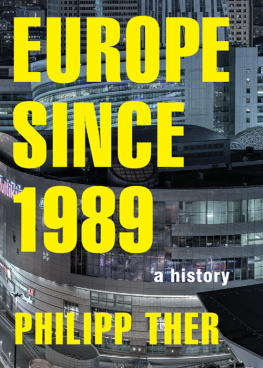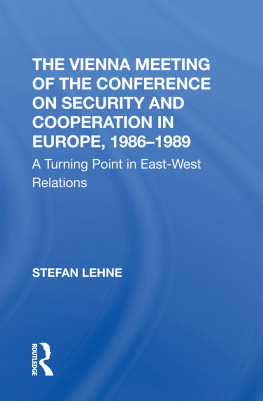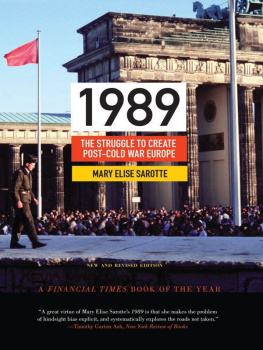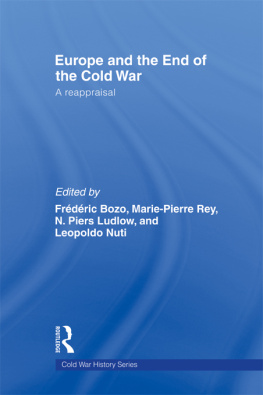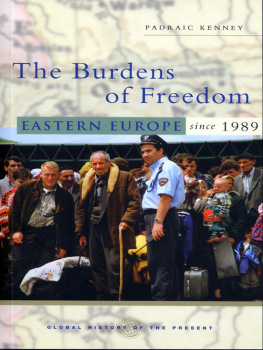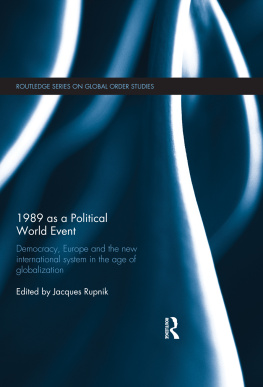Ther - Europe Since 1989
Here you can read online Ther - Europe Since 1989 full text of the book (entire story) in english for free. Download pdf and epub, get meaning, cover and reviews about this ebook. publisher: Princeton University Press, genre: Politics. Description of the work, (preface) as well as reviews are available. Best literature library LitArk.com created for fans of good reading and offers a wide selection of genres:
Romance novel
Science fiction
Adventure
Detective
Science
History
Home and family
Prose
Art
Politics
Computer
Non-fiction
Religion
Business
Children
Humor
Choose a favorite category and find really read worthwhile books. Enjoy immersion in the world of imagination, feel the emotions of the characters or learn something new for yourself, make an fascinating discovery.
Europe Since 1989: summary, description and annotation
We offer to read an annotation, description, summary or preface (depends on what the author of the book "Europe Since 1989" wrote himself). If you haven't found the necessary information about the book — write in the comments, we will try to find it.
Ther: author's other books
Who wrote Europe Since 1989? Find out the surname, the name of the author of the book and a list of all author's works by series.
Europe Since 1989 — read online for free the complete book (whole text) full work
Below is the text of the book, divided by pages. System saving the place of the last page read, allows you to conveniently read the book "Europe Since 1989" online for free, without having to search again every time where you left off. Put a bookmark, and you can go to the page where you finished reading at any time.
Font size:
Interval:
Bookmark:
EUROPE SINCE 1989
EUROPE
SINCE
1989
a history
PHILIPP THER
Translated by Charlotte Hughes-Kreutzmller
Princeton University Press
Princeton and Oxford
English translation copyright 2016 by Princeton University Press
Originally published as Die neue Ordnung auf dem alten Kontinent: eine Geschichte des neoliberalen Europa.
Copyright Suhrkamp Verlag Berlin 2014
Published by Princeton University Press, 41 William Street, Princeton, New Jersey 08540
In the United Kingdom: Princeton University Press, 6 Oxford Street, Woodstock, Oxfordshire OX20 1TR
press.princeton.edu
Jacket photograph courtesy of Przemysaw Zacharuk
All Rights Reserved
ISBN 978-0-691-16737-4
Library of Congress Control Number: 2016931665
British Library Cataloging-in-Publication Data is available
The translation of this work was funded by Geisteswissenschaften InternationalTranslation Funding for Humanities and Social Sciences from Germany, a joint initiative of the Fritz Thyssen Foundation, the German Federal Foreign Office, the collecting society VG WORT and the Brsenverein des Deutschen Buchhandels (German Publishers & Booksellers Association).
This book has been composed in Baskerville 120 Pro and Swiss 721
Printed on acid-free paper.
Printed in the United States of America
10 9 8 7 6 5 4 3 2 1
CONTENTS
PREFACE TO THE ENGLISH EDITION
Britains decision to leave the European Union confronts it with a very uncertain future, but is also another strong signal that a period of European history has come to a close. The British plebiscite against the EU confirms the fragility of the neoliberal order that emerged in the 1980s. The first big blow came with the stock market crash of 20089 and the subsequent economic crisis. Some countries, like Germany, have recovered from the crisis, but southern Europe and the lower middle classes across large parts of the continent have not.
The political responses to neoliberalism are proving even more explosive than its economic consequences. Populists all over Europe are exploiting the general discontent with high unemployment, insecure and badly paid jobs for the young, and intensifying economic competition due to free trade and labor migrants. As Brexit shows, the old specter of nationalism is back again, and has greater popular appeal than the EU, which has been made the scapegoat for all sorts of social and economic problems. The populists promise to safeguard their ethnically defined nation from the ills of global competition, labor competition at home, rising criminality, foreign terrorists, and the decay of traditional national values. But their more fundamental allure lies in the fact that they have successfully contradicted the Thatcherite slogan There is no alternative, once mocked as TINA. This antipolitical mode of argumentation was misused to press through several major economic and social reforms, and unfortunately even European integration and the EU project. The Brexit campaign succeeded because it insisted there is an alternative, even if it is detrimental to large parts of the population and might in fact lead to the dissolution of the United Kingdom.
Though the Brexit vote occurred seven years after the crisis of 20089, there is another connection between the two events. In several postcommunist countries, the crisis was so severe that it resulted in unprecedented mass migration. In 2015 Europe was preoccupied with the arrival of more than one million refugees from the Middle East (and blatantly failed to find a common response to this challenge) but, contrary to the popular view, this influx was considerably less than the labor migration triggered by the crisis of 20089. Between 2009 and 2011, Romania lost 2.4 million inhabitants, or more than 10 percent of its population; Latvia and Lithuania lost several hundred thousand, mostly through labor migration. These people left their homes not only to escape the deep recession, but also in reaction to the drastic social cuts demanded by the International Monetary Fund and its various rescue packages. The United Kingdom was the most important receiving country for labor migrants from Eastern Europe. This immigration helped the UK to recover economically from the crisis, but also increased the job competition for the lower middle class. The right-wing populists of the UK Independence Party (UKIP) built their campaign on popular dissatisfaction with the growing economic pressure, especially on the labor market. Will Denmark, the Netherlands, France, and other countries with strong right-wing populist movements follow the English example? The rise of Donald Trump shows that this is not merely a European problem. Such questions about the future are beyond the ambit of historians. But by analyzing the past, one might better understand the present tendency toward closed societies, as opposed to the open societies once conceptualized by Karl Popper and realized in large parts of Europe after 1989.
Another proponent of closed societies and a major external challenge for the European Union and the West at large is Vladimir Putin. Russian aggression against Ukraine has ended a long phase of peace on the continent, one that had helped to strengthen the postcommunist economies and sustain social spending in Western Europe after the end of the Cold War. The authoritarian turn in Eastern Europe is not confined to Russia; it has infected Hungary and is threatening to grip Poland. New splits have appeared not only between the East and West of Europe, but also between the North and South. Another large country and a founding member of the EU, Italy, has not yet recovered from the crisis. In fact, labor migration from Italy is on the rise, and from Greece even more so. In the long run, these imbalances and the growing economic and social gaps between countries and especially within societies are jeopardizing the achievements of European integration, such as open borders, more than the challenge posed by the refugees from the Middle East and Africa.
The only consolation in this gloomy picture is the fact that at certain moments in recent history the situation was worse. This was true in the early 1990s, when Yugoslavia fell apart in a bloody and protracted civil war, resulting in a refugee crisis even more severe than the present one. The Soviet Union and its most important successor state, the Russian Federation, were plunged into chaos, and the standard Western economic recipes did not seem to work. In fact, even the expert bets on Poland were mixed in those years: unemployment was constantly rising, social protests threatened to derail reforms, the postcommunists won the elections in 1993, and it was not clear whether the economy had already hit bottom. Moreover, the European Union was divided between further integration and enlargement, and it failed miserably to bring order to its own backyard in Yugoslavia or devise a new Marshall Plan for the Eastern neighbors knocking at its doors.
And yet nowadays commentators look back calmly at the turbulent early 1990s, and even idealize the economic reforms enacted then. This tendency shaped the self-affirming debate in the United States about the postcommunist transformation at the twenty-fifth anniversary of 1989. In 2014 a pair of American scholars writing for Foreign Affairs made the bold claim that the postcommunist states had become normal countries. These neoliberal success stories glossed over Russia in the 1990s, where the depression was as deep as the one in the United States in the 1930s. And one should not forget that the disintegration of Yugoslavia and of Czechoslovakia was caused in part by conflicts over whether to enact radical or gradual reforms. Even in relatively successful countries such as Poland, the economic reforms brought suffering to millions of people in rural and old industrial regions. The hardship experienced by transformations losers and disillusionment with neoliberal capitalism have created fertile ground for populist parties, authoritarian tendencies, and even neo-fascist movements. As a result of the crisis, Western Europe is now facing similar challenges.
Next pageFont size:
Interval:
Bookmark:
Similar books «Europe Since 1989»
Look at similar books to Europe Since 1989. We have selected literature similar in name and meaning in the hope of providing readers with more options to find new, interesting, not yet read works.
Discussion, reviews of the book Europe Since 1989 and just readers' own opinions. Leave your comments, write what you think about the work, its meaning or the main characters. Specify what exactly you liked and what you didn't like, and why you think so.

